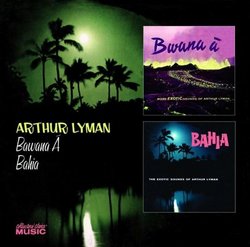Early exotica, heavy on the percussion and Latin rhythms
hyperbolium | Earth, USA | 05/15/2008
(4 out of 5 stars)
"Hawaii-born Arthur Lyman joined with Martin Denny to invent "exotica" on the latter's 1957 debut album. Exotica combined the melodic sounds of the islands with unusual percussion (notably the scratching sound of the guiro), pop changes, and human-voiced bird calls to create a soundtrack to the late `50s fascination with all things tiki. As a vibraphonist, Lyman's jazz background added an element of cool to Denny's classical training. Splitting after their debut release, Lyman created a new quartet and recorded dozens of exotica-inflected albums for the Hi-Fi, Life and Crescendo labels. Collectors' Choice latest series of reissues gathers eighteen of Lyman's releases from Hi-Fi and Life, fits them two per CD, includes full-panel reproductions of both album covers, adds a full-panel back cover and new liner notes from Scram's Kim Cooper and David Smay.
This series begins with Lyman's fourth release, 1959's Bwana A, opening with a percussive tropical forest of drums, gongs, bird calls and chants laced by trilling flute. This evocative instrumental creativity is a primary thread running throughout exotica, whether it's horns mimicking passing ships, rice flowing on a drumhead to sound frothy waves, or the insect scratch of the gourd-based guiro. Asian influences here include the Japanese-flavored "Otome San," and the bamboo-flute introduction to "Canton Rose." Lyman gives Schubert's "Serenade" a Latin flavor, with piano underwritten by hand- and stick-played drums, and vibraphone that drifts from a soft, soothing breeze to multi-mallet strikes that double the piano's chords. The Latin influences continue in a gentle rendering of "La Paloma," and the dervish-like swirl of "Malaguena." Lyman turns the tables on "Vera Cruz," slowing to a jungle crawl and lining it with bird calls. The understated, flowing style of the islands returns in "Pua Carnation," and the album closes with an arrangement of The Bridge Over the River Kwai's "Colonel Bogey's March" that steps up from woozy-bluesy to sharp and corporal.
Lyman's sixth album, 1959's Bahia, opens with the requisite jungle sounds and a bass-and-piano riff that inverts and echoes Martin Denny's playing on "Quiet Village." It's an inventive surprise, given that the title track was written by the Brazilian composer Ary Barroso. The Latin flavor is more pronounced in the rhythms of "Caribbean Nights" and "Return to Me," the latter winningly combining bossa nova with the Italian charm of Dean Martin's original hit, and even Les Baxter's frantic "Busy Port" has a Latin edge to its percussion. Lyman steps up to several Baxter tunes here, something he'd mostly avoided on earlier albums. "Jungle Jalopy" is spare, with a rhythmic piano riff driving you deeper into a jungle of blue piano and vibraphone spirals, and "Quiet Village" is rendered substantially more serene than Denny's signature original, with vibes and flute taking the lead and the piano chords in the bridge laid on with restraint. "Legend of the Rain" opens with a thunderclap that gives way to light sprinkles from Lyman's vibes, and eventually to a low, jazzy melody annotated by the relaxing sound of slack key guitar.
Of the two LPs, Bahia is the superior, with songs more inventively picked and arranged, and a wider range of tempos and instrumentation, including steel, slack key and ukulele. The percussion on Bahia, whether providing the rhythm for Lyman's vibes, or taking the lead with bells, chimes, drums and maracas, is especially invigorating. Bwana A is presented here in mono, apparently remastered from vinyl. Pops and clicks can be heard on both "Moon Over a Ruined Castle" and "Otome San." The latter also seems to overmodulate in spots. Bahia is in stereo, and shows none of the audio defects of Bwana A. [©2008 hyperbolium dot com]"
I like it
Ing Robert Kaiplinger | Wien | 08/16/2008
(3 out of 5 stars)
"As someone who likes the music of Arthur Lyman especially his warm, romantic and tender melodies I am highly delighted about the release of this set of 9 CDs as a reissue of part of his recordings. The reissue appears in good quality close to the original issues of vinyls in the late 50's and 60's.
Unforunately there are a few remarks:
Examples:
1. at least on Lyman '66 "The Boy From Laupahoehoe": a rhythm error
exists at 1:33 where some portion of the recording is missing. This
could have been corrected resp. compensated easily. I have tried it
successfully.
2. "Colorful Percussions": Dropout on left channel between 2:41,900 and
2:42,700. That dropout appears on the original vinyl too. Even that (I
have also tried to correct successfully) could have been done during
mastering.
3. There are a few tracks in mono, but why the complete 12 tracks
of "Bwana á" are in mono cannot be understood."


 Track Listings (24) - Disc #1
Track Listings (24) - Disc #1